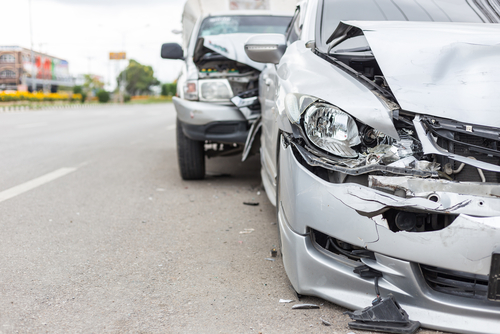Today, we’re going to go over some of the most important things you’re going to want to know about the laws and regulations concerning Georgia auto accidents when you’ve been in one. We’ll go over the statute of limitations for personal injury and property damage claims, the issues associated with fault and comparative negligence, and the auto insurance requirements and recommendations in the state of Georgia.
Georgia’s Statutes of Limitations for Auto Accident Claims
All states have a statute of limitations for auto accident claims, personal injury claims, wrongful death claims, and property damage claims. Sometimes, you’ll be dealing with more than one or even all of them in one case. Whenever injuries occur from an auto accident, you have a personal injury auto accident claim, and the statute of limitations is two years from the date of the incident. If there is a death, then you may have a wrongful death claim, and the statute of limitations is two years from the date of death. If you are dealing with a property damage claim, then the statute of limitations is four years from the date of the incident.
It is important to note that the statutes of limitations refer to how much time you have to file a lawsuit, not an insurance claim. Yet, you need to file your insurance claim early enough to have plenty of time to file a lawsuit if the insurance claim negotiations don’t pan out as you hope. In many cases, you’ll be able to settle an insurance claim, even after filing a lawsuit, and the case won’t necessarily end up in court just because you file a lawsuit.
Georgia’s Fault and Comparative Negligence Rules in Auto Accident Claims
Some states are no-fault states, where you turn to your own auto insurance policy, no matter who actually caused the accident. Georgia, however, is a fault state. It is also a modified comparative negligence state. This means that when you get into an auto accident, you turn to the insurance policy of the at-fault driver for coverage. It further means that if you are partially at fault for the accident, you can still recover compensation as long as you are not 50% at fault (or more). If you are at least 50% at fault for the incident, then you cannot recover compensation from the other driver’s auto insurance policy.
Georgia’s Legal Auto Insurance Policy Requirements
There are many forms of auto insurance available in Georgia, and only certain forms of coverage are actually required by law. Yet, it is wise to purchase more auto insurance than is legally required. Because Georgia is a fault state when it comes to auto insurance, you have to have liability coverage on your vehicle to address personal injuries, deaths, and property damage that may arise from any auto accident in which you hold the majority of fault.
Whenever an auto accident in Georgia causes injuries, deaths, or damage, the victims can turn directly to the liability coverage of the auto insurance policy of the at-fault driver for compensation. They can also file a claim with their own insurance policy, though that policy will then seek compensation from the auto insurance policy of the at-fault driver. If the victims are not successful in seeking fair compensation through auto insurance settlement negotiations, then they may seek compensation through a civil court personal injury lawsuit.
The minimum requirements for auto insurance liability coverage in Georgia are much like many other states, and include a minimum of $25K for personal injury or death of a single person in one accident, $50K for the personal injury or death of multiple persons in a single accident, and $25K for property damage associated with a single accident. The personal injury liability coverage is intended to address any injuries to yourself, your passengers, the drivers and passengers of other vehicles, any pedestrians or bicyclists who are involved in the incident, and any other persons who are injured by the auto accident (see https://www.oci.ga.gov/ConsumerService/AutoInsurance.aspx).
Yet, it is important to note that carrying the bare minimum of required auto insurance coverage could leave you in a difficult spot if you cause an auto accident in which the damages exceed these minimums. This is much more common than you might think, because the medical expenses and property repair expenses are often far more than what these minimum amounts of coverage will provide for. If this happens in an auto accident that you are responsible for, then you could face personal liability for the damages that exceed your coverage.
If you are in an auto accident in which someone else is at-fault, then your injuries and damages could easily exceed the amount of coverage that they have on their auto insurance policies. In such cases, you can pursue a personal injury lawsuit against the at-fault driver, but this does not necessarily mean that you will ever see the compensation that you seek, even if it is awarded to you by the court. Many people do not have the resources to cover the owed compensation, and though this will have a negative impact on their lives (and they may even end up having to file for bankruptcy due to the judgment against them), that doesn’t help you with your expenses.
Georgia’s Uninsured and Underinsured Motorist Coverage Options
Because of the limits associated with liability coverage when drivers only purchase the bare minimums required by law, some states require that drivers also purchase uninsured/underinsured motorist coverage (UIM coverage). Georgia does not require you to purchase this type of coverage, but the attorneys at John B. Jackson & Associates certainly recommend that you do, just so that you are prepared for all eventualities.
What UIM coverage does for you is to provide an additional source of insurance coverage in cases where the at-fault driver’s auto insurance coverage doesn’t fully cover your damages. It also provides a resource for coverage in cases where the at-fault driver doesn’t have any auto insurance policy at all. It is illegal for a driver to not carry auto insurance coverage, but it is far from unheard of for such incidents to happen. While the at-fault driver will surely face consequences for violating the law, that will not help you with your financial needs.
You can learn more about the laws and auto insurance requirements and options in Georgia by contacting the skilled car accident attorneys in Atlanta at the Law Office of John B. Jackson & Associates for a free consultation.






